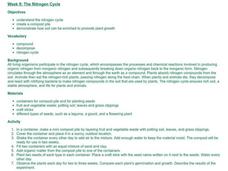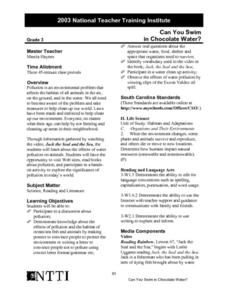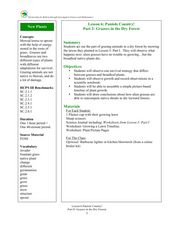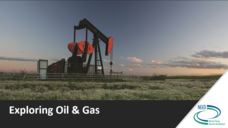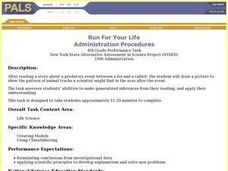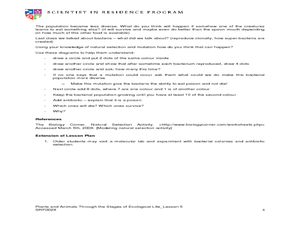Curated OER
How Dry I Am
Students observe two similar plants as one gets regular water and one does not. They observe plants for a week and record their findings.
Curated OER
Mini-Ponds
In this mini pond worksheet, learners create a mini-pond ecosystem with soil, water, and plant life. Students let their ecosystem sit for a day and they observe a sample the next day. Learners identify all the pond water microorganisms...
Curated OER
Planting Seeds Around the World
First graders discuss the book The Lorax and research what living things need. In this environmental instructional activity, 1st graders investigate how humans affect the growth of plants. Students conduct an experiment with sunflowers.
Curated OER
The Nitrogen Cycle
Students design and create a compost pile in order to study the Nitrogen Cycle. They then use the scientific method to determine if plants grow better when they add organic matter from their compost pile to the plant's soil.
Curated OER
Bugs in the Woods
Second graders identify insects and plants in the forest ecosystem in a structured field trip with stations and activity booklets. In this bugs instructional activity, 2nd graders explore the ecosystem of the forest, complete the...
Curated OER
Shelter
Students study shelter and how plants, animals, and people must have shelter to survive. In this shelter lesson, students read paragraphs about various shelters and their necessity with plants, animals, and people.
Curated OER
Creature Features
Young scholars examine why certain animals live in only specific places throughout the world. Using animals, they classify them based on their characteristics and identify their basic needs. They also observe and compare the life cycles...
Curated OER
The Web of Life - Ecosystem
Students examine the concepts of ecosystems and interdependence. They construct block pyramids to demonstrate interdependence, and map off an area to observe and identify animals. They create food chain mobiles and play a web of life game.
Curated OER
The Mechanisms of Decay and Decomposition
Eighth graders study how all living things die. They are introduced tot he life cycle and the concept of an ecosystem. Students have a introductory exposure to trophic levels (producer-consumer-decomposer) in the environment.
Curated OER
Can You Swim in Chocolate Water?
Third graders discss water pollution and its affects on animals. They watch a demonstration using a plastic fish in a fish bowl in which various types of water pollution are illustrated.
Curated OER
Winter Season
Learners recognize the relationship between Earth's tilt and the Winter season. In this Winter instructional activity, students work in pairs to complete make frost and design snow goggles. Learners experiment a hand lens to study the...
Curated OER
Lesson 6: Paniolo Country Grazers in the Dry Forest
Learners explore grazing animals in a dry forest. For this science lesson, students act out the role of a grazer in the dry forest. Learners cut their growing lawn and observe what happens after being cut. Students explore differences...
Curated OER
The Life Cycle of a Flowering Plant
In this flowering plant worksheet, students will review vocabulary words associated with the life cycle of flowering plants. This worksheet has 7 matching and 3 short answer questions.
Curated OER
Winter Survival
Students examine what animals need in order to survive. In this investigative lesson plan students play a "role" of an animal in winter.
Curated OER
Home Sweet Home
Students examine the animals that live in trees. They identify their sounds, footprints and droppings. They draw pictures of the animals as well.
Curated OER
Explorit's Wetlands Quiz
In this wetlands worksheet, students complete a 31 question multiple choice on-line interactive quiz about wetlands. Included are questions about plants, animals and geography.
Curated OER
RIDE THE WILD LEAF
Students identify and interpret that leaves provide food for new trees and plants. Students cut out leaves and glue them on the appropriate
number on included worksheet. Students collect different types of leaves and make leaf rubbings....
Curated OER
The Biological Carbon Cycle
Students learn about the biological carbon cycle. In this carbon cycle lesson, students access the web site and mouse over the diagrams to follow the carbon cycle. They read about what happens to humans and plants during this cycle.
Curated OER
Water Quality and Temperature
Students are led through three activities to explore the effect of temperature fluctuations on the growth and survival of aquatic plants, clams, and shrimp eggs.
Curated OER
Birth, Growth, And Development
Students understand that all living things have a life cycle that includes being born, developing into an adult, reproducing, and eventually dying.
Curated OER
Winer Survival
Students study how animals need water, food, shelter, and space to survive. They also study what animals need to survive in the winter. They play the part of animals and winter "threats" in a game of tag to reinforce concepts.
National Energy Education Development Project
Exploring Oil and Gas
The United States consumes more oil than any other country, about 1.85 billion barrels (or 77 billion gallons) a day. Viewers learn about the history of fossil fuel exploration and how they are formed in an informative presentation. They...
Curated OER
Run For Your Life
Students draw a picture of animal tracks a scientist might find after they read a story about a fox chasing a rabbit. They make up a key to represent the foxes' tracks and the rabbit's tracks.
Curated OER
Populations- The Survival of the Fittest
Students examine the ways that populations become diverse and how mutation changes the diversity of a population. In this exploratory lesson students study natural selection by completing a lab activity and discussing what they learned.





